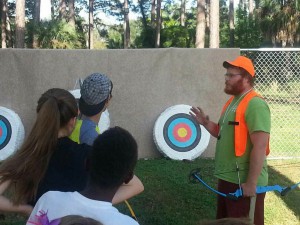by Heather Kent | Apr 8, 2016

Our volunteers help make clubs, camps, and other educational programs possible so that we can Grow 4-H in Florida! Photo credit: National 4-H Council
Sunday, April 10th, marks the beginning of National Volunteer Week. A recent study found that volunteers are directly responsible for teaching as much as 50% of the life skills a youth learns through the 4-H program (Fogarty et al). Volunteers are essential to the delivery of the 4-H program, and starting on Sunday, we want to share some of their stories with you.
Our volunteers come to us with a variety of expertise. Some volunteer a little, some volunteer a lot, but every single one of them makes a difference. And they all have one thing in common: to ignite that spark in the next generation by sharing their passion, knowledge and skills. 4-H is delivered in several different ways; our most traditional way is through community clubs. We also have clubs that are centered around a particular project or subject such as robotics, fishing, sewing, etc. Some clubs event meet during or after school. There are also short-term programs that are delivered through the schools such as embryology, 4-H/Tropicana Public Speaking, gardening, and agricultural awareness. Another popular way we deliver 4-H is through our residential and day camping programs. 4-H volunteers help make all of this possible under the leadership and direction of their local 4-H Extension Agent.
Each day, we will highlight a different type of 4-H volunteer to give you an overview of the different roles our volunteers serve. We hope this series will not only inspire you, but create more awareness of our volunteer programs. Most importantly, we want to recognize the wonderful contributions that each of these volunteers is making. If you are not already a volunteer, think about sharing your talents with us! You can fuel the extraordinary efforts of our youth by joining us as a volunteer. To find out more, contact your local UF IFAS Extension Office or visit http://florida4h.org/volunteers. Happy National Volunteer Appreciation Week- we hope you will enjoy our series as much as we enjoy working with our incredible volunteers!

by Melanie Taylor | Dec 11, 2015
 The holidays are often filled with time-honored traditions that include some of our favorite meals and foods. As you celebrate, think of little changes you can make this holiday season to create healthier meals and active days. An added bonus, these small changes may help you to avoid those extra holiday pounds we all fear each year. Happy Cooking!
The holidays are often filled with time-honored traditions that include some of our favorite meals and foods. As you celebrate, think of little changes you can make this holiday season to create healthier meals and active days. An added bonus, these small changes may help you to avoid those extra holiday pounds we all fear each year. Happy Cooking!
In the Kitchen:
• For gravies or sauces — if you are making pan gravy, first skim the fat off pan drippings. For cream or white sauces, use fat-free (skim) milk and soft tub or liquid margarine.
• For dressings or stuffing — add low-sodium broth or pan drippings with the fat skimmed off instead of lard or butter. Use herbs and spices and a whole grain bread for added flavor.
• For biscuits — use vegetable oil instead of lard or butter and fat-free (skim) milk or 1 percent buttermilk instead of regular milk.
• For greens — use skin-free smoked turkey, liquid smoke, fat-free bacon bits, or low-fat bacon instead of fatty meats.
• For sweet potato pie — mash sweet potato with orange juice concentrate, nutmeg, vanilla, cinnamon, and only one egg. Leave out the butter.
• For cakes, cookies, quick breads, and pancakes — use egg whites or egg substitute instead of whole eggs. Two egg whites can be substituted in many recipes for one whole egg.
• Use unsweetened applesauce or mashed ripe bananas instead of butter.
• Try cutting the amount of sugar listed in recipes in half.
• Use spices to add flavor such as cinnamon, allspice, or nutmeg instead of salt.
• Try baked apples with cinnamon and a sprinkle of sugar instead of apple pie.
• Invite your guests to make their own parfait with colorful sliced fruit and low-fat yogurt.
For meats and poultry (chicken and turkey):
• Trim away all of the visible fat from meats and poultry before cooking.
• Take off poultry skin before eating.
• Broil, grill, roast, poach, or boil meat, poultry, or fish instead of frying.
• Drain off any fat that appears during cooking.
• Chill meat and poultry broth until fat becomes solid. Skim off fat before using the broth.
• Skip or limit the breading on meat, poultry, or fish. Breading adds fat and calories. It will also cause the food to soak up more fat during frying.
• Choose and prepare foods without high fat sauces or gravies.
When Shopping:
• Start with a lean choice.
• The leanest beef cuts include round steaks and roasts (round eye, top round, bottom round, round tip), top loin, top sirloin, and chuck shoulder and arm roasts.
• The leanest pork choices include pork loin, tenderloin, center loin, and ham.
• Boneless skinless chicken breasts and turkey cutlets are the leanest poultry choice.
Use the food label to help you choose
• Choose extra lean ground beef. The label should say at least “90% lean.” You may be able to find ground beef that is 93% or 95% lean.
• Processed meats such as hams, sausages, frankfurters, and luncheon or deli meats have added sodium. Check the ingredient and Nutrition Facts label to help limit sodium intake.
• Fresh chicken, turkey, and pork that have been enhanced with a salt-containing solution also have added sodium. Check the product label for statements such as “self-basting” or “contains up to __% of __.”
• Lower fat versions of many processed meats are available. Look on the Nutrition Facts label to choose products with less fat and saturated fat.
De-Saturate
• Use a nonstick pan with vegetable cooking oil spray or a small amount of liquid vegetable oil instead of lard, butter, shortening, or other fats that are solid at room temperature.
Enjoy the Food, Fun, Friends and Family!
Cheers to Good Health
• Quench your thirst with low-calorie options. Drink water with lemon or lime slices. Offer seltzer water with a splash of 100% fruit juice.
Be the Life of the Party
• Laugh, mingle, dance, and play games. Focus on fun and enjoy the company of others.
Give to Others
• Spend time providing foods or preparing meals for those who may need a little help. Give food to a local food bank or volunteer to serve meals at a shelter during the holiday season. Giving back is a great mood booster.
Make Exercise a Part of the Fun
• Make being active part of your holiday tradition. Have fun walking and talking with family and friends after a holiday meal. Give gifts that encourage others to practice healthy habits such as workout DVDs, running shoes, and reusable water bottles.
Enjoy the Leftovers
• Create delicious new meals with your leftovers. Add turkey to soups or salads. Use extra veggies in omelets, sandwiches, or stews. The possibilities are endless!
Be sure your family and friends enjoy the food and fun, but focus on the time together. Remember this season is all about the memories, not just the food. You will feel better and enjoy your holiday time with less worry if you focus on staying healthy this season.
Source: USDA United States Department of Agriculture – www.MyPlate.gov
by Heather Kent | Aug 21, 2015
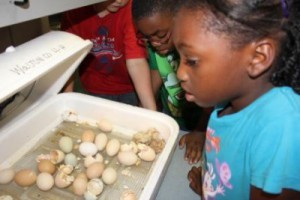
4-H embryology is a great way for school youth to learn about STEM and agriculture
For more than 100 years, 4-H clubs have been (and still are) the backbone of our youth development program. But did you know that 4-H also provides opportunities for youth to participate in programs during and after school? Not all youth have access to transportation to and from club meetings. 4-H school programs are a great way for those youth to glean the benefits of 4-H and to learn about other opportunities to be involved longer term.
Some examples of 4-H School programs offered in the 4-H Panhandle include:
Sometimes school programs such as 4-H Embryology or 4-H Tropicana Public Speaking are taught by teachers, using 4-H curriculum and resources with support from the 4-H Extension Agent. Other programs are coordinated with a team of volunteers and 4-H staff (such as 4-H Ag Awareness or Ag Literacy Week). County Extension offices offer training, curriculum, and equipment for teachers and volunteers interested in leading 4-H programs at local schools. In addition, these programs receive support from extension agents and UF IFAS specialists with subject matter expertise, so you can be sure that youth are receiving the most up to date, non-biased information available.
If you have skills that you would like to share with the next generation, consider partnering with your local school and 4-H program. To find out which opportunities are available in your area, contact your local UF IFAS County Extension Office or visit http://florida4h.org/volunteers.
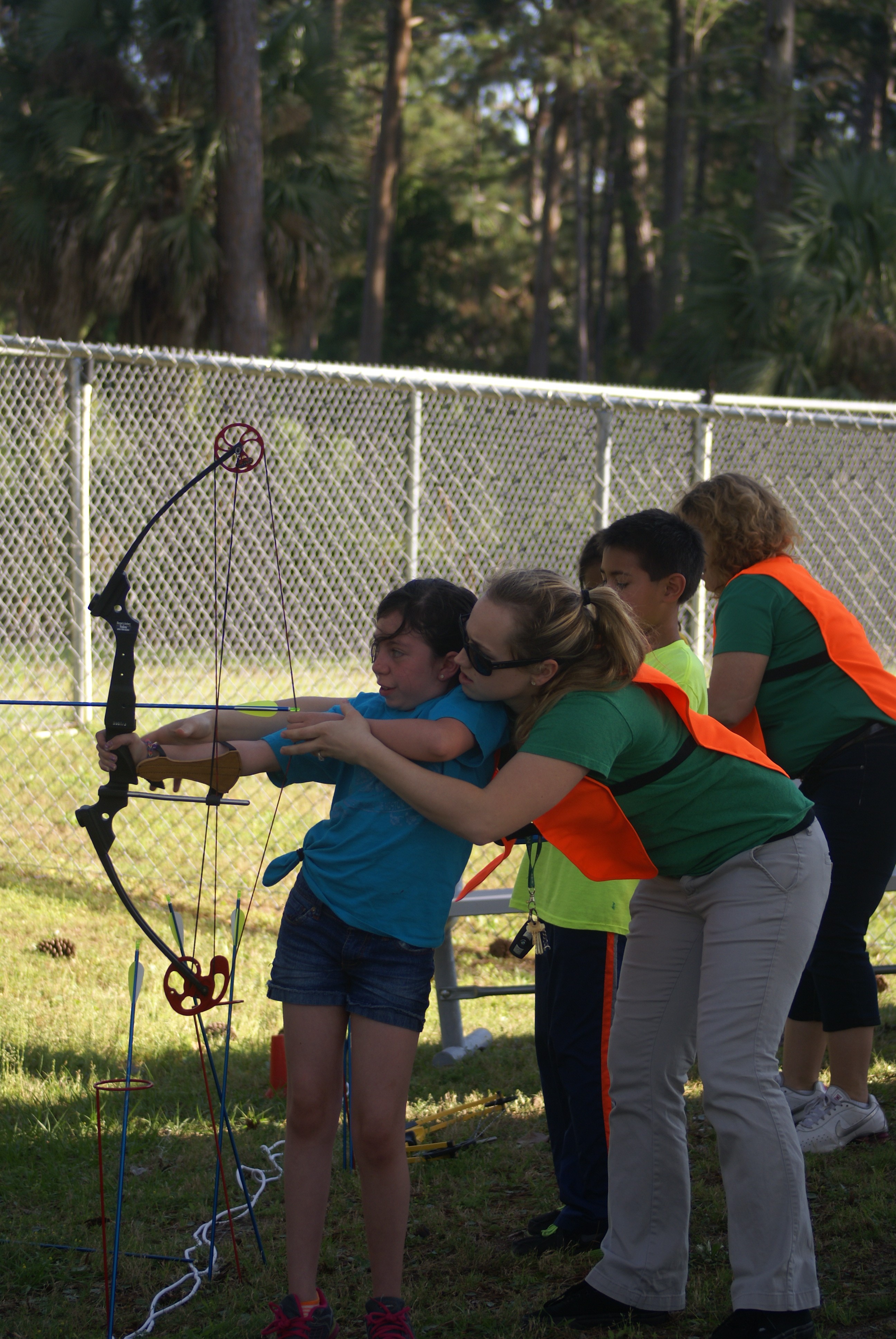
by pmdavis | Apr 16, 2015
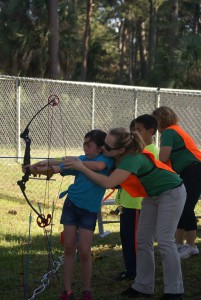
Volunteers insure that military youth have a consistent, quality 4-H experience.
April is the Month of the Military Child, and no Volunteer Appreciation Celebration would be complete without acknowledging our 4-H military volunteers. The team of volunteers and staff at the Naval Support Activity Youth Center in Panama City ensure that military youth have an opportunity to participate in a wide variety of 4-H Programs at their youth center. One of the newest programs they offer is the 4-H shooting sports project. The leadership team for this 4-H club include Ms. Alana, Mr. Cole, Ms. Heather, Ms. Jessica, Ms. Shelby and Ms. Tammy. To allow all interested youth to participate, they started multiple archery clubs that meet weekly helping new archers develop strength, accuracy, and discipline. A small competitive traveling team has also been organized to help youth improve their skills and potential of becoming competitive archers through their 4-H learning experiences.
Cole is a five year veteran 4-H volunteer who did not grow up in 4-H, but was drawn into the program by the opportunity to teach youth life and workface related skills through projects like archery, aerospace, film making, photography, outdoor cookery, robotics and rocketry. His favorite 4-H experience so far has been with the rocketry project: “The youth just really got into it! We learned about force, drag and flight. It was a unified project where everyone became involved and the learning just exploded. They were learning physics, science, and communication skills all at once. 4-H can really make a difference and cause youth to consider different careers too. It is really nice when you see a child that may be struggling in a different part of their life find their niche during one of the 4-H projects. You just see their confidence sky rocket and then carry over into their social confidence also.”
When talking with him recently he said that “4-H is conducive to relationship building while learning life skills allowing both youth and myself to grow. It gives us an organized meeting time with specific goals and direction allowing us to maximize our time and growth. It helps make a difference because it is the conduit running in the background to allow everything to happen. 4-H allows the flexibility of being able to try ideas, experience things and make their curricula work for my needs. The best part is that when youth leave here they have something consistent to look forward to at their next duty station. It provides youth with one consistent thing to look forward to. I feel like we are literally planting the seeds to help youth develop their life skills. The program is nationwide and can help with the many changes and challenges our youth face. We are an important cog in the wheel for navy youth.”
Cole offers advice for anyone thinking about working with 4-H and kids. “If you have even an inkling that you would enjoy working with youth, then do so! It can be very valuable to that child, to know someone cares about them. Your follow through with one child can make a great deal of difference in their life and be the encouragement they need to become something great. Quite often there are not enough role models and caring adults for today’s children. Take the 4-H challenge and help a kid today!”
Dr. Paula Davis, the Bay County 4-H Agent says, “I want to recognize that this 4-H club is truly a team effort. With so many youth involved, it definitely can’t be done with one just person. I really appreciate the teams diligence, enthusiasm, and willingness to try new things with 4-H. The quality of a youth’s 4-H experience to a large extent depends on the relationship built between the 4-H members and their volunteer leaders, and these are some of the best!”
Do you have a passion or expertise that you would like to pass on to the next generation? Consider becoming a 4-H volunteer- we offer a wide variety of opportunities to fit your interests and schedule. Contact your local UF IFAS Extension Office or visit http://florida4h.org/volunteers.
by Heather Kent | Apr 15, 2015
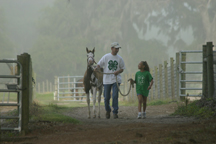
UF IFAS Photo
Last year, more than 4,000 youth participated in the Florida 4-H Horse Project. These youth would have never had the opportunity to learn horsemanship and leadership skills without horse project volunteers. Project leaders not only work with 4-H clubs, they often serve on committees to help plan and implement shows and other horse related events. In the Florida panhandle, twenty-three volunteers comprise the Area A 4-H Horse Advisory Committee. These volunteers plan and execute our district qualifying show (coming up this weekend in Marianna) as well as assist with the state horse show in Tampa. They also plan other horse project related events such as horse judging, showmanship clinics, nutrition seminars, 4-H Hippology and Horse Quiz Bowl.
“The Area A Horse Committee Volunteers are some of the most dedicated volunteers I have ever met,” shares Heather Kent, the regional 4-H agent. “Many of them have witnessed first-hand the potential of the 4-H horse program to help youth learn lifelong leadership and communication skills and they share a legacy of caring and compassion that influences every youth they work with.”
Terry Stout is one of those volunteers. Terry states, “I grew up in 4-H and FFA and when my daughters were old enough, they joined the Eglin Riding Stables 4-H Club to learn how to groom and care for their horses. 4-H was a large influence on them and now that they are alumni, they give back by teaching and helping the next generation of horse kids. I have learned a lot as a volunteer, and I am involved on many advisory boards because I know I can help most by being a voice for youth and other volunteers.”
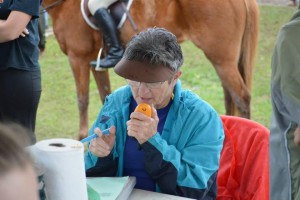
4-H volunteers plan and implement educational events at the club, county, district and even state levels. Escambia County 4-H Photo
Anne Peterson, a 4-H volunteer from Escambia County, says “I became involved with 4-H when my daughter was 10 years old. I have always wanted to protect our youth and see that they receive the best instruction possible for their horse project. In order to see this happen, I became involved in the local, area, and state horse program. Today I still see the need for volunteers to continue making the best better and as long as there is a need I want to help any way I can.” Anne was inducted to the Florida 4-H Hall of Fame in 2013 for her service as a volunteer.
Barry Hoffman, a Leon County volunteer, got involved in 1997 with the Trailblazers 4-H Club. Seeing a need for funds to help youth attend 4-H horse camp, Barry led a committee to organize a Horse Expo at the North Florida Fairgrounds to teach others about riding techniques, horse management, tack sales, and more. “Barry is always available to help with whatever is needed- which has even included helping me when by car broke down on the interstate on the way to a horse committee meeting. He continues to serve at the district level eleven years after his youngest son graduated from 4-H. Barry plays a major role in both the area and state horse shows, and is an incredibly valuable resource for us,” says Marcus Boston, the Leon County 4-H Agent.
Jean McMillian, a Gulf County volunteer, has been involved for more than 40 years. Roy Carter, the Gulf County Extension Director says, “Mrs. McMullian has led three generations of 4-H youth through the 4-H horse program. Her club, the Big River Riders 4-H Club, holds the county record for the longest running 4-H club and she is one of the strongest leaders we have ever had the pleasure to work with. She has been the backbone of our horse program and is always willing to help in any capacity.” Her son Russell is continuing the family tradition by being involved as the co-chair for the speed events for the area qualifying show.
Terry Harris has volunteered in both Jackson and Gadsden counties since the early 90’s, helping hundreds of youth with their horse projects. Angel Granger, the Jackson County 4-H Agent shares, “Even though his nephews are grown now, Terry continues to work tirelessly with 4-H and is a wonderful advocate for the program. We are very fortunate to have someone like him working at both the club level and serving as a member of the 4-H Area A Horse Advisory Committee.”
Lucy Notestine has been a volunteer for the last 8 years, and currently serves as the Area A Horse Advisory President. She, her daughter Shane Kenny and Dara Strickland raise over $2,000.00 each year to provide incentive awards for area horse show participants. Their 4-H Agent, Dr. Paula Davis says, “They realize that many youth are too young to advance to the state show therefore they work really hard to make the Area A Show a special event to encourage further participation and help the program grow.”
These stories have one very important thing in common- each of these volunteers has a heart for helping young people succeed. If you have a similar passion, consider becoming a 4-H volunteer. To find out how, contact your local Extension Office or visit http://florida4h.org/volunteers. If you are a parent or volunteer new to the 4-H Horse Project, Angel Granger,has developed a handy checklist to help you prepare for your next show. You can download the checklist and keep it in your show box or horse trailer so that you are always prepared to do your very best. If you laminate the list, you can use a dry-erase marker to check items off each time you pack your trailer.
Your opinion matters to us! Please complete this short survey so we can improve this blog https://ufl.qualtrics.com/SE/?SID=SV_3gtLKjqia3F75QN.






